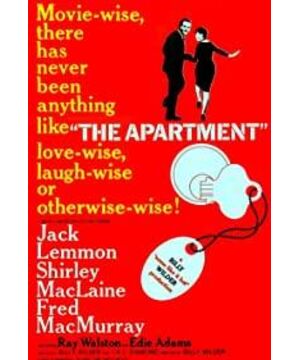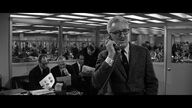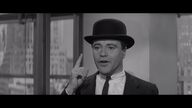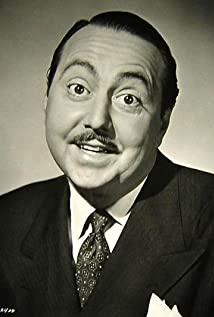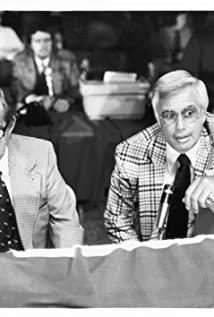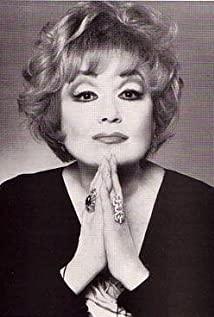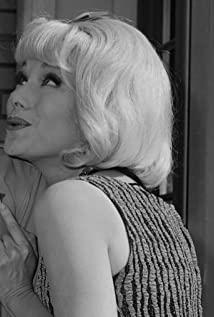Jack Lemmon, an ordinary clerk at an insurance company, rose to prominence because he lent his apartment to various bosses for trysts with lovers. Until one day, he accidentally discovered that the woman whom the biggest boss, Mr. Sheldrake, brought to the apartment for a tryst was the lively and beautiful elevator lady Shirley MacLean, whom he had been secretly in love with. One Christmas Eve, Jack Lemmon came home disheartened and found that Shirley MacLean had taken a lot of sleeping pills and tried to commit suicide; the reason for her suicide was that Shirley MacLean realized that she was only one of the boss's lovers, here Before, there were three more, of course, which she already knew. She gave the boss a record, and Mr. Sheldrake said it was not easy to take home, so he gave her a hundred dollars, because it was too rude to go to the mall to pick a gift for Shirley MacLean. With that, Mr. Sheldrake went home with a pair of presents for his children and wife. For the next two days, Jack Lemmon took care of Shirley MacLean. At the beginning of the new year, Mr. Sheldrake faces a divorce lawsuit from his wife because his ex-lover told his eldest wife, so Shirley MacLean returned to the embrace of the boss. On New Year's Eve, Mr. Sheldrake borrows the apartment keys from Jack Lemmon for a tryst with Shirley MacLean; Jack Lemmon refuses and resigns. He said he wanted to be a "person". When Shirley MacLean learned of this, she resolutely left Mr. Sheldrake and ran to the "Peach Apartment". Jack Lemmon tells Shirley MacLean: He loves her so much. Shirley MacLean calmly picked up the cards and started their unfinished game, coolly saying, and also the famous ending in Billy Wilder's films: "Shut up and deal" (deal). A pun, which can be read as, "Shut up and start playing cards.", or "Shut up and make a deal!")
Billy Wilder said about the film "Someone said , it's my best comedy. But I've never made 'Peachy Flat' as a comedy. I think it's a comedy. But they were laughing while watching the movie, and I wouldn't argue."
No matter how many times I watch "Peachy Apartment", I still laugh every now and then. The ridiculousness of "Peachy Apartment" comes from the way it shows the living conditions of one or several little people. Yes, little people, little people like you and me, little people drowning in the endless desk on the nineteenth floor of the United Insurance Company. The little guy was nervous when he saw the big guy, so nervous that Jack Lemmon accidentally squeezed out the nasal spray and sprayed it on the boss's suit. It's ridiculous that Leigh MacLean grabs it; it's ridiculous that the little people without a home are dealing with it, and Jack Lemmon uses a tennis racket as a sieve to filter the macaroni; it's ridiculous that the little people can get care, such as the kind but a little neurotic neighbor aunt. There is no need to list all of these, people who have seen the movie will naturally smile.
The film has a different way of laughing for the "big men" in it. Just had sex with my lover, I can turn my head and say, "I am a happily married man." They complained that Jack Lemmon was too selfish and didn't allow them to borrow the apartment for a tryst... If the little guy is struggling, the big guy is lying and perfunctory. The laughter comes from the torn between their appearance and their inside; it comes from their unknowing peace of mind even though they have turned their moral standards upside down. Although this laugh is different from the other, the audience laughed after all. Everything was unexpected, but it was all reasonable. The comedy effect comes from the inner structure of the film's story, not the burlesque or sloppy lines that are piled up on the surface of some comedy films. Real comedy doesn't need butterscotch. And the film's "happy reunion" ending added a lot of footnotes to "Peachy Apartment" as a "comedy". Shirley MacLean left the emotional liar, Jack Lemmon decided to start from scratch and be a good "human", the two met in a peach-colored apartment, and the little man won love.
However, this is not a complete "Prince and Princess" story. "Prince" lost his job; and "Princess", who can type but not spelling, can only drive the elevator. Since he rejected the boss, he is about to be fired. This is an unemployed "prince", and the unemployed "princess", will they live happily ever after? Adding in the "adult games" above, it's no wonder that some film critics say Billy Wilder's "Peachy Apartment" is a "dirty fairy tale" that only Billy Wilder can say. I half agree with this. Only Billy Wilder could tell a story like this, and it's not a fairy tale. Princes and princesses have weaknesses, even fatal ones. Jack Lemmon lends his apartment to various bosses to try out various pornographers, in order that they will have a good word for him in his report so he can climb the company faster. Shirley MacLean knew that Mr. Sheldrake had a family, but he was still his lover. The vanity mirror that Shirley MacLean forgot in Jack Lemmon's apartment almost said everything about the film.
"Peachy Apartment" is also a Billy Wilder "dark humor" literary film. A small company employee lent his apartment to his boss for an affair, half forced and half voluntarily - he benefited from it, became a celebrity in the eyes of his boss, and was promoted. It wasn't until he found out that the elevator girl he fell in love with also had a tryst with his boss in his apartment, and he re-examined his life. The film perfectly captures the involuntary humble situation of the little people and the desire to change their own destiny, and presents a certain characteristic of America in the 1950s in a light-hearted and humorous way. Jack Lemmon and Shirley MacLean, like us, are little people with weaknesses. Men want to have career, fame and fortune, and women want to be loved; so Jack Lemmon pursued the deformed "American Dream" in a deformed way, and Shirley MacLean pursued deformed love in a deformed way. Jack Lemmon said, "The mirror cracked." Shirley MacLean said "I like it that way, just like me." Like a broken mirror, they are torn apart by desire and weakness. They were not princes and princesses, they were just ordinary people. It can be said that "Peachy Apartment" continues the conclusion of "nobody's perfect" in the previous film "Passion Like Fire", but extends understanding and sympathy.
So when the last two little people got together and Shirley MacLean said "Shut up and Deal," they both forgave each other, which was very touching. At this point, I knew Billy Wilder had "a perfect balance of skepticism and sensibility." This is indeed a story that only Billy Wilder could tell.
The scene at the end of "Peachy Flat" where Shirley MacLean runs to the street is the perfect shot in my mind. Although the picture is exquisite and perfect, the director's handling of the image style is no more unique or innovative than that of American films at the time or before. In "Peachy Apartment", Billy Wilder uses skilled sarcasm to describe the love of men and women in the city, creating a special comedy flavor, which is created by his mind. Heroes - pioneered by the great director Ernst Lubitsch. As for the depiction of boring office life, it was inspired by the images in King Vidor's "The Masses". In addition, Billy Wilder knew Charlie Chaplin's films well, so Chaplin's usual mixed comedy style of teasing and infatuation is also fully used to portray the empty and desolate state of mind of the characters in the film.
The cast is amazing and Shirley MacLean is brilliant. The movie is funny and unfortunate in its own way. It is profoundly observant, but occasionally presents a little ridiculous comedy. It felt incredibly mature and showed me a different way to approach comedy. That is to render the seemingly mundane trivial events in life into a moving and wonderful grand narrative. The visual style of the film seems very simple, and that's because Billy Wilder isn't a very showy director, and that really struck me. It doesn't have to be done with long shots like David Lean or the surrealism of David Lynch. It's so neutral, so plain, it's almost always traditional. It is not only made with care but also with precision. Wilder often remarks that his reluctance to put a camera behind a burning fireplace is because it will never be possible to observe honest life from behind a fireplace. The film has drawn criticism for not being cinematic enough, due to its heavy reliance on dialogue rather than pure imagery to drive the plot, but that is just a rather arbitrary conclusion some people have drawn about how the art of cinema should be viewed. To me, it's both a paragon of romantic comedy and a masterclass in narrative.
View more about The Apartment reviews


